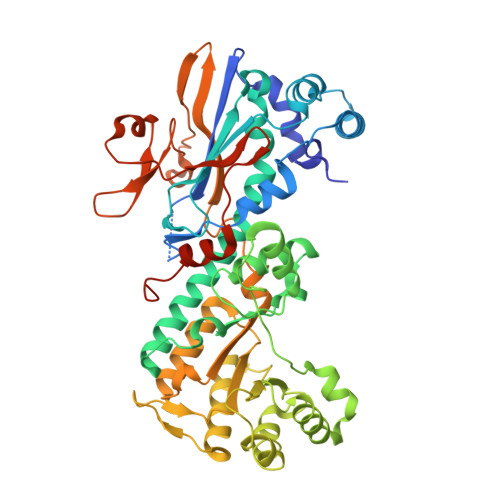Identification of 2,3-dihydro-1H-pyrrolo[3,4-c]pyridine-derived ureas as potent inhibitors of human nicotinamide phosphoribosyltransferase (NAMPT).
Dragovich, P.S., Bair, K.W., Baumeister, T., Ho, Y.C., Liederer, B.M., Liu, X., Liu, Y., O'Brien, T., Oeh, J., Sampath, D., Skelton, N., Wang, L., Wang, W., Wu, H., Xiao, Y., Yuen, P.W., Zak, M., Zhang, L., Zheng, X.(2013) Bioorg Med Chem Lett 23: 4875-4885
- PubMed: 23899614
- DOI: https://doi.org/10.1016/j.bmcl.2013.06.090
- Primary Citation of Related Structures:
4KFP - PubMed Abstract:
Potent nicotinamide phosphoribosyltransferase (NAMPT) inhibitors containing 2,3-dihydro-1H-pyrrolo[3,4-c]pyridine-derived ureas were identified using structure-based design techniques. The new compounds displayed improved aqueous solubilities, determined using a high-throughput solubility assessment, relative to previously disclosed urea and amide-containing NAMPT inhibitors. An optimized 2,3-dihydro-1H-pyrrolo[3,4-c]pyridine-derived compound exhibited potent anti-NAMPT activity (18; BC NAMPT IC50 = 11 nM; PC-3 antiproliferative IC50 = 36 nM), satisfactory mouse PK properties, and was efficacious in a PC-3 mouse xenograft model. The crystal structure of another optimized compound (29; NAMPT IC50 = 10nM; A2780 antiproliferative IC50 = 7 nM) in complex with the NAMPT protein was also determined.
- Genentech Inc, 1 DNA Way, South San Francisco, California 94080, USA. dragovich.peter@gene.com
Organizational Affiliation:



















